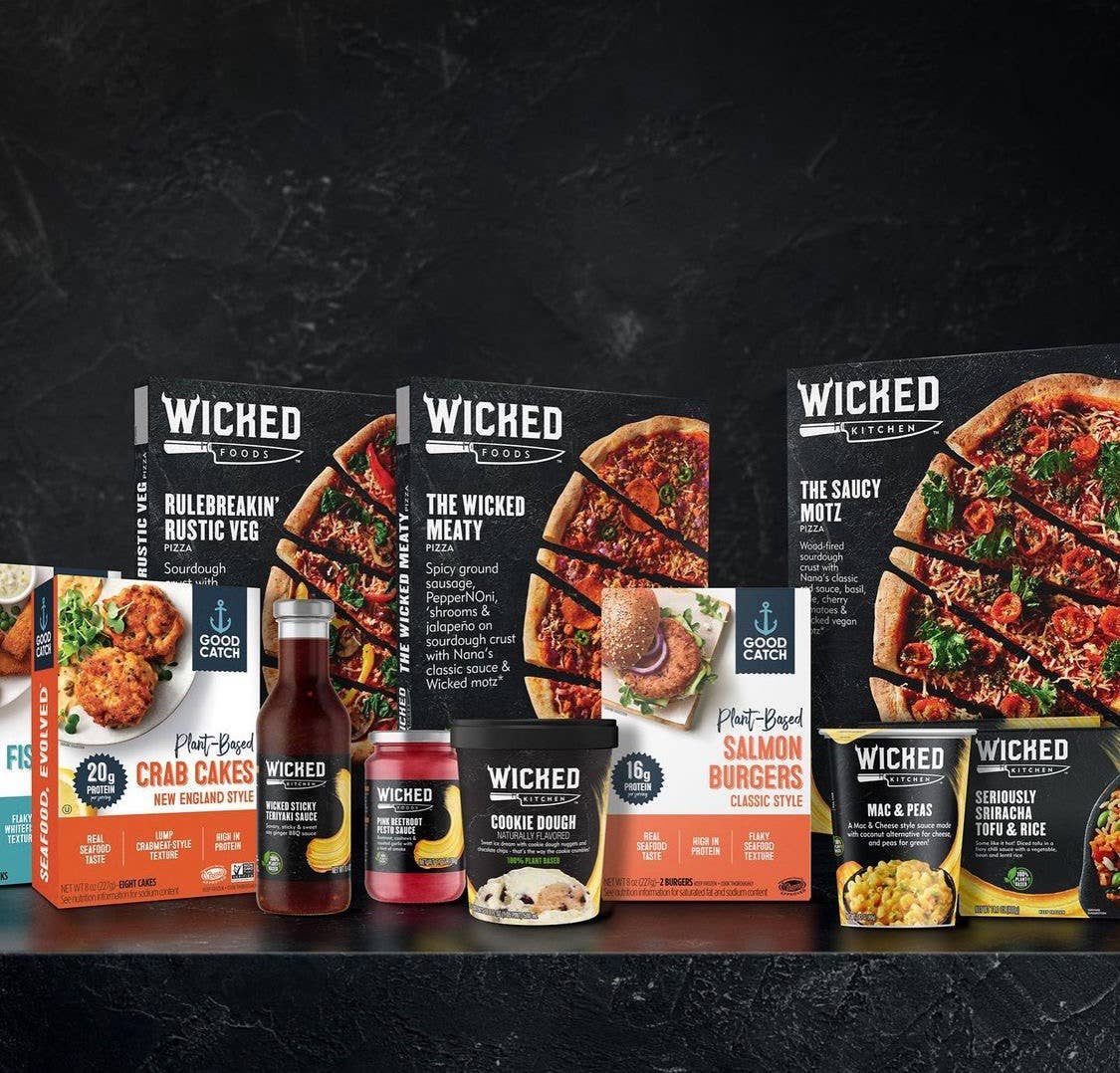
Plant-Based Seafood Companies Raised $116 Million in the First Half of 2021
Fish alternatives seem to be jumping out of the water as new plant-based seafood products rapidly reach stores, restaurants, and plates worldwide. Companies like Gathered Foods, BlueNalu, and New Wave Foods have paved the way for the plant-based fish market, raising more than $116 million in investment capital in the first half of 2021. The Good Food Institute (GFI) just released its first State of the Industry Report for plant-based seafood. GFI conducted the research to examine the rapidly expanding seafood sector and its consumer impact.
The report details how plant-based seafood s experiencing an exponential rise, driving up investment in the sector to surpass the $90 million invested in 2020 in just the first six months of 2021. The investments come from 11 disclosed deals, but the report also notes there were four more deals where the investment value was omitted so it could be much higher.
GFI’s industry report explores the retail sales data alongside the company investments. The report highlights that the plant-based food market grew 27 percent within the US, nearly twice the rate of the total US food market. Specifically, alternative seafood retail sales grew by 23 percent from $10 million in 2019 to $12 million in 2020. The plant-based seafood market is predicted to experience a significantly higher growth rate by the end of 2021.
The report explains that the plant-based seafood category is currently an untapped sector of the entire plant-based industry, and while a few companies have started vegan seafood development, the market is predicted to see substantial growth and investment in the coming years.
Based on the current expansion rate, GFI predicts that plant-based seafood sales could increase by $221 million if the vegan category reaches the same percentage that plant-based has on the meat market. The report also notes that the alternative seafood market could see even more profits because a significant percent of seafood sales in the US come from the foodservice sector, valued at 65 percent.
“While this early growth is promising, alternative seafood remains a market whitespace, and is a fraction of the size of the alternative protein market, which is, in turn, a small slice of the overall meat and seafood market,” the report reads.
In 2019, only 29 companies worldwide offered alternative seafood products compared to the 87 companies reported in June 2021. Through the report, GFI showcases some of the leading plant-based seafood companies such as Gathered Foods’ Good Catch and OmniFoods. Good Catch – founded by Derek and Chad Sarno – recently closed a $26 million funding round intended to help develop its product selection and expand its product distribution across the world.
The company also brought the world its first vegan fast-food seafood when it partnered with Long John Silver’s. Good Catch and Long John Silver’s debuted a new Plant-Based Platter featuring two Fish-Free Fillets, two Crab-Free Cakes, and two sides at select California and Georgia locations. The partnership aimed to expand the plant-based seafood range into new foodservice areas to increase accessibility.
“Gathered Foods has a serious sense of urgency,” Executive Chair Chris Kerr said. “In each funding round, we search for value-added, strategic investors to bring the company to its next definitive milestone. In the case of our Series B, this was a focus on global supply chain and distribution, each of which will be paramount to the next phase in the company’s growth.”
Primarily known for its signature pork alternative, OmniFoods expanded its product range to include alternative seafood earlier this year. The company – owned by food conglomerate Green Monday – expanded its product selection to include two fish fillets, an ocean burger, salmon, crab cakes, and shelf-stable tuna. OmniFoods’ seafood is currently available at Hong Kong retailers and restaurants. The company has yet to announce further distribution.
“We cannot tackle climate change without addressing the destruction of our oceans,” Founder and CEO of Green Monday David Yeung said. “Overfishing and bottom trawling devastate our marine ecosystems. While conventional seafood accounts for 17 percent of animal-based protein sales in the U.S., plant-based seafood only accounts for less than 1 percent of the entire plant-based protein market in the U.S. This is why, since the launch of OmniPork in 2018, Green Monday has started focusing on seafood. The OmniSeafood series promises to not only wow taste buds, but also to awaken our consciousness toward our oceans.”
The plant-based seafood pioneers have also encouraged bigger food giants to begin developing vegan alternatives. Earlier this year, Cargill launched vegan scallops in partnership with the Japanese convenience store chain Lawson. Swiss-based food giant Nestle also just announced its plant-based shrimp, Vrimp, to accompany its inaugural plant-based seafood product, Vuna. With larger international companies shifting to plant-based seafood, the worldwide alternative seafood market is slated to grow.
Sandra Oh and 20 Others It Might Surprise You to Learn Are Plant-Based
1. Paul McCartney
Sir James Paul McCartney is no stranger to a meat-free life as he's been vegetarian for 45 years. He initially went vegetarian in 1975 with his first wife Linda McCartney and began his advocacy for animal rights.
2. Sia
If you find yourself constantly singing along to the song The Greatest, then you're already a Sia fan. Sia tweeted that she is "fully vegan now" back in 2014 and stays true to her word
3. Sandra Oh
Way back at the start of Grey's Anatomy, Sandra Oh took the cast out for a plant-based lunch at Truly Vegan in Hollywood. In her effort to inspire contemporaries to eat vegan, the TV star is known to invite her friends for vegan meals that are delicious. She adopted the vegan lifestyle years ago and continues to quietly live a cruelty-free life.
4. Gisele Bündchen
Giselle revealed that when she was at the peak of her modeling career, her diet consisted of "cigarettes, wine, and mocha Frappuccinos," according to an interview in People Magazine. Now 39 and the mother of two children, Gisele eats a "mostly" plant-based diet to nourish her body and stay fueled.
5. Alec Baldwin
Alec Baldwin has made a bigger commitment to plant-based eating since he was first told by doctors that he was pre-diabetic and needed to change his diet. That was decades ago. But, over the last few years, he's been vocal about the benefits not only to his health but also the impact plant-based eating has on the environment.
7. Pamela Anderson
We all remember Pamela Anderson as the curvaceous blonde in the hit series Baywatch as she played Casey Jean in the red one-piece swimsuit that brought her world-class fame. She is a life-long active animal rights advocate and teamed up with PETA to join the Animal Protection Organization.
8. Kristen Stewart
"We shouldn't eat as much meat guys," Kristen Stewart told GQ in an interview in January. The Twilight star has made a full 180 from vampire to vegan. When she appeared on the game show "Hot Ones" she chose to skip the wings and instead compete by eating increasing spicier sauce on vegan cauliflower wings.
9. Jared Leto
This award-winning actor eats a high-protein diet consisting of only plants. Leto, who has been plant-based for 20 years, says it keeps him "shredded" in an interview. Now, 48, Leto looks half his age.
10. Jaden Smith
Jaden Smith switched up his diet from vegan to vegetarian, meaning that he doesn't eat meat but does eat dairy from time to time. In a recent article by Plant Based News, Smith admits he skipped meals and was not getting the proper nutrition when he was vegan, but this hasn't stopped him from espousing the plant-based life.
11. Meghan Markle
Meghan, the Duchess of Sussex has never admitted to being fully vegan, but sources say, she eats a plant-based diet most days during the week. She is teaching Prince Harry vegan cooking and in a Plant-Based News article, Markle explained how she hopes to raise baby Archie on a mostly vegan diet.
12. Serena Williams
As a professional athlete, fueling the body is a key factor to Willaim's successes. In a Bon Appetite article, she explained that she adopted a plant-based diet back in 2012, she was eating a lot "healthier" for her sister, Venus, who eats a strict vegan diet for health reasons.
13. John Mackey
The popular grocery store, Whole Foods Market sells vegan products and nonvegan products which arises black lash from ethical vegans as CEO John Mackey follows a strict vegan diet. The successful businessman grew up in Houston Texas and told Business Insider that he would traditionally eat processed foods for dinner while watching TV with his family. Now, Mackey steers clear from the processed isle and eats a clean vegan diet and feels amazing at the age of 65.
14. Jason Mraz
Jason Mraz, singer of the popular song, I'm Yours, committed to a vegan diet to support his friend diagnosed with Type 2 diabetes. Mraz says he eats mostly raw food and told magazine sources his favorite vegan dish is "Chocomole, a mixture of avocados, dates, cacao, agave nectar, and coconut oil."
15. Leona Lewis
Long time vegan, Leona Lewis grew up in a vegan household and continues to eat a plant-based diet. Lewis first adopted the diet at 12 when she learned about the health risks of eating animal products but told Women's Health Magazine she occasionally eats an omelet. She also mentioned her 2:30 lunch is normally a kale salad topped with dried cranberries and she loves a veggie stir-fry for dinner.
16. Hannah Teter
Hannah Teter changed her diet after watching the documentary, Earthlings when she discovered how "horrible" factory farming is. After a strict vegetarian diet, Teter liked the way she performed as an athlete and believes that her diet helped her win gold at the 2006 games.
17. Maggie Q,
You may recognize Maggie Q as the star of the Nikita series, but in the plant-based world, she's well-known for her heroic activism. Maggie Q has followed a strict vegan diet for 19 years, making her a true veteran of the lifestyle. She made the plant-based diet transition because she felt sluggish and had low energy, she has said. The famous actress keeps in shape by eating veggies and plant-based protein and working out with a passion.
18. Madelaine Petsch,
Winner of the first Masterchef vegan cook-off with Gordon Ramsay, Madelaine Petsch was raised vegetarian and went completely vegan at age 14. She claims that she started this diet before it was "trendy" and shot a campaign for PETA last year wearing a dress made of bok choy. Petsch says her vegan diet allows her to feel "healthier" and not "lethargic."
19. Millie Bobbi Brown
After doing a little sleuthing on her social media platforms we think Millie Bobbi Brown qualifies as plant-based. Whether or not she is actually skipping all meat and dairy, one thing is for sure: She eats mostly salads, vegetables and grains and lives a predominantly plant-based lifestyle full of healthy foods.
20. Chloe and Halle Bailey
The grammy-nominated sisters went vegan for a week with their mom but liked it so much they decided to stick with it. For one thing, it helps keep their "voices in shape" by eating a vegan diet and they emphasize the fact that dairy helps to limit extra mucus build-up, according to a PETA interview.
21. Hilary Duff
Best known for her role as Lizzie Mcguire in the long-running series, Hilary Duff is a recent vegan advocate and entrepreneur. She recently launched the vegan and cruelty-free eyeshadow palette, "Day Dreamer" and changed her diet to plant-based last fall.
More From The Beet






